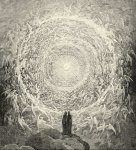Once St. Gaudens took him down to Amiens, with a party of Frenchmen, to see the cathedral. Not until they found themselves actually studying the sculpture of the western portal, did it dawn on Adams’s mind that, for his purposes, St. Gaudens on that spot had more interest to him than the cathedral itself. Great men before great monuments express great truths, provided they are not taken too solemnly. Adams never tired of quoting the supreme phrase of his idol Gibbon, before the Gothic Cathedrals:—“I darted a contemptuous look on the stately monuments of superstition.” Even in the footnotes of his history, Gibbon had never inserted a bit of humor more human than this, and one would have paid largely for a photograph of the fat little historian, on the background of Notre Dame of Amiens, trying to persuade his readers—perhaps himself,—that he was darting a contemptuous look on the stately monument, for which he felt in fact the respect which every man of his vast study and active mind always feels before objects worthy of it; but besides the humor, one felt also the relation. Gibbon ignored the Virgin, because in 1789 religious monuments were out of fashion. In 1900 his remark sounded fresh and simple as the green fields to ears that had heard a hundred years of other remarks, mostly no more fresh and certainly less simple. Without malice, one might find it more instructive than a whole lecture of Ruskin. One sees what one brings, and at that moment Gibbon brought the French Revolution. Ruskin brought reaction against the Revolution. St. Gaudens had passed beyond all. He liked the stately monuments much more than he liked Gibbon or Ruskin; he loved their dignity; their unity; their scale; their lines; their lights and shadows; their decorative sculpture; but he was even less conscious than they of the force that created it all,—the Virgin, the Woman,—by whose genius “the stately monuments of superstition” were built, through which she was expressed. He would have seen more meaning in Isis with the cow’s horns, at Edfoo, who expressed the same thought. The art remained, but the energy was lost even upon the artist.


